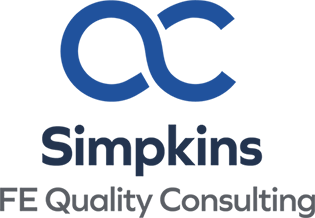
So What? Are You Asking the Right Questions? A Guide to Preparing for Ofsted Inspections
When it comes to educational outcomes, institutions often focus on outputs, such as completion rates, enrolment numbers, or curriculum coverage. But these outputs don’t always tell the whole story. The key to truly understanding your institution’s impact is asking the question, “So what?” What impact are your actions having on your learners, employers, and staff?
In this article, we’ll explore how to ask the right questions to ensure that the work you’re doing in your educational institution is meaningful and impactful. We’ll provide a comprehensive list of questions across various areas to help you critically assess your processes, ensuring they align with the ultimate goal of creating real and positive outcomes.

Understanding the Importance of Outcomes Over Outputs
In any educational setting, it’s easy to get caught up in metrics like the number of learners enrolled or the number of courses completed. However, these figures are simply outputs. The real question you should ask is, “So what?” What do these numbers tell you about the actual impact of your work? For example, consider a statement like, “Over 75% of our apprentices complete their apprenticeship.” – “So what?” How many of those apprentices stay in employment within the sector? How many take on additional responsibilities after completion? How many get promoted or progress to higher-level qualifications? This is where destination data becomes crucial. Knowing your destination data can give you a much clearer picture of how well your program prepares students for their careers. You can explore more about the importance of destination data here.
Are your learners progressing in their careers? Are employers satisfied with your graduates? Are your staff motivated and supported? These are the critical questions to ask to ensure your processes have a meaningful, long-term impact.
To answer these questions effectively, it’s essential to focus on the outcomes and the tangible results of your educational processes. This includes both the long-term success of learners, the readiness of students for the workforce, and the satisfaction of your staff.
Let’s break down the right questions to ask across key areas: learners, employers, and employees.
Questions About Learner Outcomes in Further Education
At the heart of any educational institution are the learners. Whether they are undertaking vocational qualifications, apprenticeships, or academic courses, their success should be the ultimate goal of all educational processes. These questions will help you critically reflect on how well your institution prepares learners for their future.
Key Questions to Consider:
- How do we assess and track the progress of learners beyond the completion of their course?
Does our tracking system measure employment retention, career progression, or advancement into further qualifications? - How do we ensure learners are equipped with the skills employers need?
Are our qualifications and course content aligned with real-world industry standards? How do we engage with employers to deliver relevant and timely training? - What is the impact of our learning interventions on students who are struggling?
Do we have support systems to ensure that students who need extra help receive it promptly and effectively? - How do we measure the soft skills learners are gaining during their studies?
Are we focusing on communication, teamwork, and problem-solving skills, and how do we assess and improve them? - How do we ensure that learners who fail to meet expectations receive the support they need to get back on track?
How do we monitor struggling students, and what interventions are in place? - How do we gather and act on student feedback to meet their needs?
What systems do we have for regular feedback collection, and how do we use this information to improve the learner experience?
Questions About Employer and Industry Alignment
Employers play a crucial role in the success of further education. For students, a key aspect of their education is how well they are prepared for the workforce. As such, educational institutions need to ask themselves whether their programs meet the expectations of employers, both in terms of skills and knowledge.
Key Questions to Consider:
- How do we ensure our curriculum aligns with the current needs of employers?
Are we regularly consulting with industry experts to ensure our programs are relevant and up-to-date? - What is the feedback from employers on the readiness of our graduates?
Do employers feel that students are equipped with the right mix of skills to succeed in the workplace? - How do we ensure students have access to meaningful work-based learning opportunities?
Are we offering enough industry placements, internships, or real-world projects to ensure students are job-ready upon graduation? - How do we ensure that our learners have developed the soft skills employers value?
Such as communication, teamwork, and leadership. - How do we track and demonstrate the success of our learners in the workplace?
Can we track how many learners secure full-time employment in their field and their progression after graduation?
- Do we involve employers in designing, reviewing, and refining our programs?
How often do we involve industry professionals in curriculum development and ensure that our courses reflect the skills employers need?
Questions About Staff Development and Support
The effectiveness of any educational institution relies heavily on the engagement, motivation, and professional development of its staff. Ensuring staff can deliver high-quality teaching and support services is essential for creating positive learner outcomes.
Key Questions to Consider:
- What professional development opportunities do we offer our staff?
Are we providing ongoing training to keep staff up-to-date with industry developments and educational best practices? - How do we support staff to develop their teaching methods and classroom management skills?
Are we offering tailored CPD (Continuing Professional Development) programs to meet the unique needs of teaching and non-teaching staff? - How do we monitor staff well-being and ensure a healthy work-life balance?
What systems do we have to gauge staff satisfaction and identify areas where support is needed? - How do we support new staff in their role, particularly those in leadership or teaching positions?
What induction processes do we have, and how do we ensure new staff feel well-prepared and supported in their roles? - How do we encourage staff collaboration within departments and across the institution?
Do we have systems in place to facilitate knowledge sharing and team development? - How do we evaluate the effectiveness of staff training and its impact on learner outcomes?
Are we linking professional development programs to measurable teaching and student achievement improvements?
Questions About Safeguarding and Student Wellbeing
The safeguarding and well-being of students are non-negotiable priorities. Ofsted inspections will focus heavily on how well institutions ensure that learners are safe, supported, and thriving in their educational environment.
Key Questions to Consider:
- What safeguarding practices are in place, and how do we monitor their effectiveness?
Are staff adequately trained to identify and respond to safeguarding issues, including online safety, abuse, and neglect? - How do we ensure that students are safe both physically and emotionally?
What steps are we taking to protect students from bullying, discrimination, and other forms of harm? - How do we support students with mental health and well-being challenges?
Do we offer counselling services, mental health resources, or other forms of support for students facing emotional or psychological difficulties? - How do we ensure that SEND (Special Educational Needs and Disabilities) students are supported effectively?
Are our policies and resources inclusive enough to meet the diverse needs of students with disabilities or additional learning needs? - How do we promote equality and diversity within the institution?
Are we fostering an inclusive environment where all students feel valued, regardless of background, gender, or disability? - How do we track and respond to safeguarding concerns and incidents?
How are concerns raised, recorded, and addressed promptly? Do we ensure transparency and accountability?
Questions About Data, Progress, and Attainment
Data is a crucial element in Ofsted inspections, but the focus is on how data is used to improve outcomes and inform decision-making rather than simply presenting raw statistics.
Key Questions to Consider:
- How do we use data to track learner progress over time?
Do we have a robust system in place for monitoring student attainment, progression, and gaps in learning? - What evidence do we have of the impact of interventions for learners who are underperforming?
Are we using data effectively to inform and adjust our teaching practices and support mechanisms? - How do we ensure that learners are on track to meet their targets and achieve their qualifications?
Do we use data to predict outcomes and intervene early if students are at risk of falling behind? - How do we ensure that all students, including disadvantaged or SEND students, are making progress?
Are we closing the achievement gaps for students who may face additional challenges? - How do we ensure that assessment results inform teaching and learning?
Do we use formative (ongoing assessments that inform teaching during the course) and summative assessments (final evaluations, such as exams or projects, that assess learner achievement) to improve lesson planning and individual learner support?
Questions About Curriculum Design and Delivery
Curriculum design is at the centre of the Ofsted inspection process. Institutions must ensure that their curriculum is coherent, ambitious, and designed to meet the needs of all learners, preparing them for the future.
Key Questions to Consider:
- How do we ensure that our curriculum meets the needs of all learners, including those with SEND and those from disadvantaged backgrounds?
Is the curriculum designed to be flexible and inclusive, offering tailored pathways for learners at different levels? - How do we evaluate the effectiveness of our curriculum?
Do we regularly assess how well our curriculum supports learner outcomes, and how do we make adjustments when necessary? - How do we ensure consistent curriculum delivery across departments and subject areas?
What mechanisms are in place to ensure high-quality teaching and curriculum delivery across the institution? - How do we engage learners in the design and delivery of the curriculum?
Are students given a voice in shaping their learning experiences, and how do we ensure their feedback is incorporated?
My Expert Opinion: Ask the Right Questions, Achieve the Right Outcomes
In Further Education, the question “So what?” is essential. It’s not just about ticking boxes or meeting outputs like completion rates; it’s about ensuring your efforts lead to meaningful, measurable outcomes. Are your processes driving success for your learners, employers, and staff?
From curriculum design, safeguarding, and data tracking to staff development, asking the right questions is fundamental. Institutions that focus on outcomes, whether improving learner achievement, satisfying employers, or enhancing staff well-being, are the ones that truly make a difference. Focusing on outcomes means creating real, positive change for everyone involved.
Regularly reflecting on these questions and engaging with staff, students, and stakeholders will not only improve your practice but also demonstrate to Ofsted that your institution is performing at its best. The impact of this approach is far-reaching, ensuring that your institution isn’t just meeting compliance but is genuinely making a difference.
If you’re ready to take a more strategic approach to achieving success and ensuring long-term positive impact, I’m here to help. Get in touch today to discuss how we can work together to drive measurable results and improvement at your institution.





